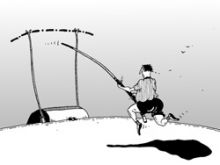Viktor Kyryk, head of the Foreign Ministry’s consular department, told at the conference called Ukraine’s Visa Policy: Ways to Reform It (organized by the Europe XXI Foundation) that this country will adhere to the parity principle in its visa policy, saying, “There is no alternative.”
EAST-WEST VECTOR
After the Baltic states enforced visa procedures for Ukrainian citizens Kyiv reciprocated, pricing Ukrainian visas at $20 each, as did the Balts. This year the Czech Republic unilaterally repealed visa-free entry for Ukraine and the Ukrainian Foreign Ministry instantly issued a statement to the same effect. The same is likely to happen on the eastern frontiers, at least Ihor Ostash, chairman of the Verkhovna Rada Committee on Foreign Affairs, thinks so after his recent visit to Central Asia. Turkmenistan was the first to take up the visa cudgel, triggering off a chain reaction in the region. Kazakhstan was next, enforcing visa entries on CIS countries except Russia. Mr. Ostash believes Astana’s stand toward Moscow will also change, as the Kremlin has introduced visa restrictions with regard to certain CIS countries. In fact, Moscow is seriously considering the issuance of special badges for foreigners seeking and getting work in Russia. There have been repeated threats to enforce visa entrance on Georgia and Azerbaijan.
Mr. Ostash says all this is evidence that politicians are beginning to understand the importance of national borders and visa-free entry, the latter meaning heavy budget losses and mounting crime. Thus, the legislator pointed out, Ukraine is doomed to change its attitude toward its eastern frontier, establishing a civilized border there.
Yuri Kochubei, former Ukrainian Ambassador to France, currently President of the Ukrainian Foreign Policy Society, also believes Ukraine should properly equip and protect its border with Russia all the way along the perimeter. Mr. Kochubei also thinks visa policy must proceed from national interests and reciprocity, and the latter may at times precede the former.
In the case of Ukraine, economic concerns have to come first and the fact was stressed by other experts taking part in the discussion. Tim Gould, executive director of the European Business Association, challenged the economic expedience of reciprocity, since visa policy means the movement of people as well as commodities. Incidentally, Mr. Kyryk admitted that motor carriage turnover has been halved due to high transport duties. Mr. Gould suggested visa- free procedures which, in his opinion, would bolster tourism and business contacts.
HUMAN FACTOR
Swedish journalist Johannes Wamberg Andersen singled out the human factor. Both foreigners and Ukrainians with relatives abroad complain of oppressive visa red tape. Besides, the cost of a visa ($30-40) is not very enticing to Ukrainians, considering that such is their average monthly pay.
Foreigners, of course, are less concerned about prices than they are about time, because time is money. They are amazed at two things: compulsory health insurance when crossing the border and registration. The latter reminds Mr. Andersen of Soviet times when every foreigner was be closely watched.
British journalist Peter Dickenson believes Ukraine should not stick to the parity principle in relation to all countries; instead, it should determine the priorities. Visa procedures should be adjusted so people visiting Ukraine would return home and tell their friends to do the same. In his case, three of his four friends, after living through our Soviet-type registration experience, said they would never again set foot on Ukrainian soil.
Were one to believe Ukrainian government officials, the situation will soon change for the better. Mr. Kyryk states that in a month or a month and a half the invitation problem will be removed along with compulsory health insurance. Transport duties will be revised and a single duty instituted. All these proposals have been submitted to the Cabinet, he stated. Vasyl Hubko, his colleague from the Derzhkomkordon [State Border Committee] added that a processor-aided passport verification system has been developed, along with an ID card to be issued every foreigner crossing the Ukrainian border. This card will replace registration. A similar pattern is being worked out for cargoe and freight, although there is no indication when these systems will be introduced.
PARLIAMENTARY FACTOR
Mr. Ostash stressed that Ukraine has underestimated the parliamentary factor when dealing with the visa problem. As he put it, Ukrainian lawmakers could exert serious influence on other countries through their foreign counterparts, particularly through the mediation of bilateral parliamentary contact groups. Perhaps now that Verkhovna Rada has a majority it will consider the bill on the status for foreigners in Ukraine which, Mr. Kyryk said, has been under study for the past five years, never reaching the first reading stage. The new foreign affairs committee chairman promised the bill will be heard at a plenary sitting shortly.
ECONOMIC EXPEDIENCE
The head of the Foreign Ministry’s consular department has announced that visa fees brought the ministry $20 million last year, yet no one has computed the economic expediency of canceling or retaining visa procedures. The experience of the neighboring countries (Poland, the Czech Republic, Slovakia, and Hungary) that canceled entry visas for CIS countries, the USA, and Canada several years ago points to a sharp increase in foreign tourists. Rather than visa charges, Ukraine’s closest neighbors make extensive use of the $10 tax levied on people boarding international flights. Such know-how could well be used by Ukraine, provided it discards the current reactive (parity) policy and stops shooting back visas, without, as Mr. Kyryk put it, waiting for a signal from the European Union, but acting according to its own strategy based on its national interests and sober economic judgment. Even instituting visa-free procedures for the EU, without asking its opinion, if this proves advantageous to Ukraine.








